by Deep Green Resistance News Service | Apr 30, 2018 | Protests & Symbolic Acts
by Survival International
Thousands of indigenous people gathered in Brazil’s capital this week, to protest against plans to destroy their lands and lives.
The Indians, from tribes across the country, painted the streets with “blood,” marched through the city, demonstrated at government buildings, and called for their rights to be respected.
Sonia Guajajara, an indigenous leader and candidate for the Vice-Presidency in Brazil’s upcoming general election, said: “We are denouncing the genocide of our people…This is the most suffering we’ve experienced since the dictatorship. By staining the streets red, we are showing how much blood has been shed in our fight for the protection of indigenous lands… The fight goes on!”
The protest marks Brazil’s “Indigenous April” and follows the annual “Day of the Indian,” 19 April, when the country’s President often announces some progress in the protection of indigenous peoples’ ancestral lands. This year, no such announcements were made. Instead, it was reported that the head of the government’s Indigenous Affairs Department would be replaced, as he was not fulfilling the demands of anti-indigenous politicians and ranchers.
Politicians linked to the powerful agribusiness lobby are pushing through a series of laws and proposals which would make it easier for outsiders to steal indigenous peoples’ lands and exploit their resources.
This would be disastrous for tribes across the country, including the Guarani, who suffer one of the highest suicide rates in the world, as most of their land has been stolen for cattle ranching and soya, corn and sugarcane plantations.
Adalto Guarani told Survival International of the politicians’ plan: “Please help us destroy this! It’s like a bomb waiting to explode, and if it explodes, it will put an end to our very existence. Please give us a chance to survive.”
And uncontacted tribes, the most vulnerable peoples on the planet, could be wiped out if their lands are opened up. Tribes like the uncontacted Kawahiva and Awá are on the brink of extinction as they live on the run, fleeing violence from outsiders. But if their land is protected, they can thrive.
Survival International and its supporters in over 100 countries are working in partnership with tribes across Brazil to prevent their annihilation and the extinction of their uncontacted relatives.
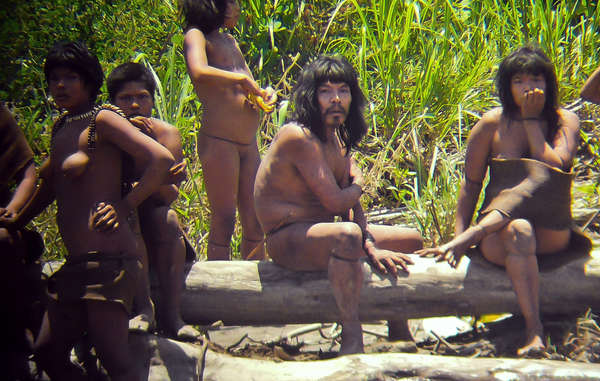
by Deep Green Resistance News Service | Apr 5, 2018 | Indigenous Autonomy
Featured image: The Mashco Piro have been increasingly entering into contact with outsiders. The new reserves are intended to ensure uncontacted groups’ lands remain undisturbed. © Jean-Paul Van Belle
by Survival International
Peru is to create two Amazonian reserves for the protection of uncontacted tribes , covering more than 2.5 million hectares. At least seven distinct groups of uncontacted tribes, including Matsés Indians, are known to be living in the areas comprising the new Yavari Tapiche and Yavari Mirin reserves in Peru’s NE Amazon state of Loreto.
The remote region has been under intense pressure from oil exploration, logging and a proposed road that could wreak devastation on the tribes. Those wishing to exploit the area’s natural resources have long denied the existence of tribes living in these forests, whose presence would obstruct their plans.
However, the Peruvian government has not ruled out further oil exploration and has taken over two oil concessions inside the new Yavari Tapiche and Yavari Mirin Reserves. Survival International, the global movement for tribal peoples, and the only organization fighting worldwide to stop the extermination of uncontacted tribes, has written to the government, along with thousands of supporters, calling for a total ban on all resource extraction in the reserves and for the two existing oil blocks to be canceled.
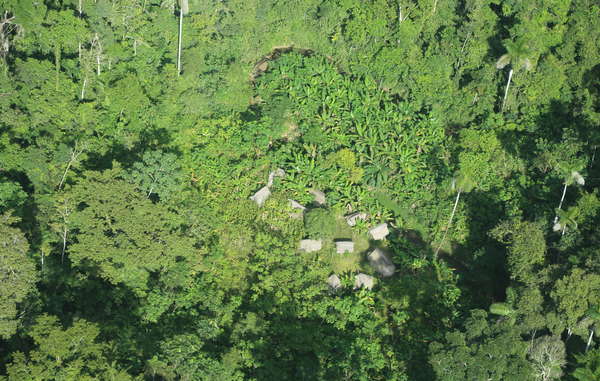
Communal houses of an uncontacted Indian community near the new Yavari-Tapiche reserve. © Melissa Medina/ IBC/ ORPIO
The reserves are crucial to the future survival of the uncontacted tribes, who face catastrophe unless their land is protected. Whole populations are being wiped out by violence from outsiders who steal their land and resources, and by diseases like the flu and measles to which they have no resistance. Entire groups can be rapidly decimated.
A Matsés man told Survival International: “Life before contact was incredible. Our uncontacted brothers still live in the forest. They live like we did before. Because the uncontacted people are out there, we want the government to protect the land.”
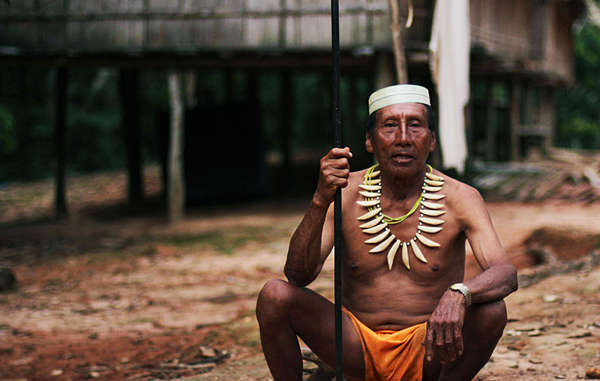
Since contact, the Matsés have suffered from diseases, especially malaria, that their plant-based medicines cannot cure. © Survival International
Survival International’s Director Stephen Corry said: “Though we welcome the creation of the Yavari Tapiche and Yavari Mirin Reserves, the Peruvian government’s refusal to ban all resource extraction is a serious concern. Uncontacted tribes are the most vulnerable peoples on the planet. They’re our contemporaries and a vitally important part of humankind’s diversity.”
The creation of the two new protected areas in Peru follows years of intense campaigning by indigenous peoplesand their supporters. However, three more proposed reserves are still awaiting formation. The longer the government delays the creation of protected areas, the greater the threat to the tribes who live there.
Background Information:
– Uncontacted tribes are tribal peoples who have no peaceful contact with anyone in the mainstream or dominant society. These could be entire peoples or smaller groups of already contacted tribes.
– Some may have been in touch with the colonist society in the past, and then retreated from the violence which that brought. Some may once have been part of larger tribal groups, and split off and moved away, fleeing contact.
– Uncontacted tribes are not backward and primitive relics of a remote past. They are contemporary societies and where their rights are respected, they continue to thrive.
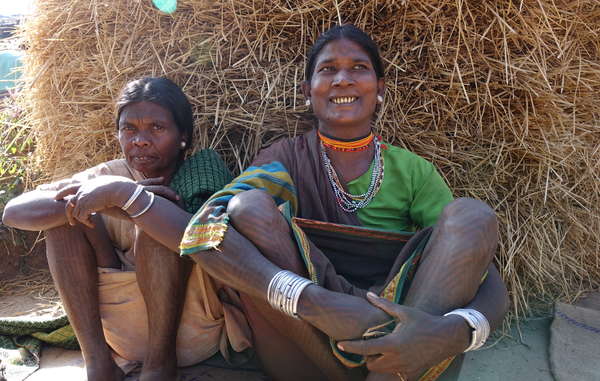
by Deep Green Resistance News Service | Mar 15, 2018 | Colonialism & Conquest
Featured image: Baiga women threatened with illegal eviction, Achanakmar Tiger Reserve. The villagers are determined to stay and say they don’t want to leave their forest home. © Survival International
by Survival International
Hundreds of Baiga people from the area that inspired Kipling’s The Jungle Book are rallying to oppose the authorities’ attempts to evict them from the forests that they have lived in and managed since time immemorial.
Baiga tribespeople are joining forces from over 70 different villages in an area of 1,500 square kilometres. The protests have been sparked by official efforts to evict two Baiga communities from a wildlife “corridor.” Dozens of neighboring Baiga communities are now terrified they will be next, as they face poverty, exploitation and misery if forced from their homes.
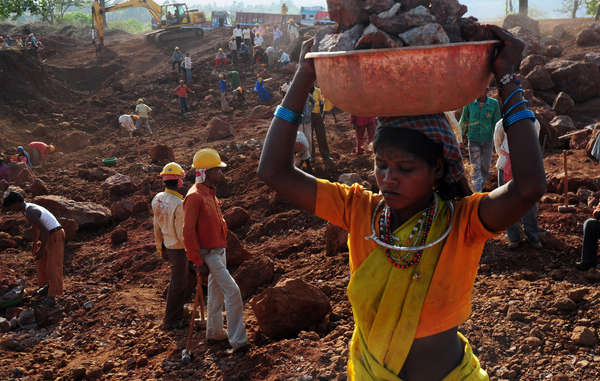
The fate that could await many Baiga threatened with illegal eviction: a Baiga woman works for a pittance in a bauxite mine. © Sayantan Bera/Survival
The Baiga are particularly worried by the two upcoming evictions, as both state authorities and the World Wildlife Fund (WWF) promised that evictions would not take place in the “corridor” areas, which run between the protected nature reserves.
By law, any resettlements of tribal people must be voluntary, even for those living in designated conservation areas. However Baiga people report threats, intimidation and violence until they have no choice but to leave their homes.
Baiga elder, Bhardan Singh told Survival International: “The forest guards beat me until I fell from the tree. I split my hip bone and couldn’t stand. I crawled to the edge of the park. The guards just left me and walked away.”
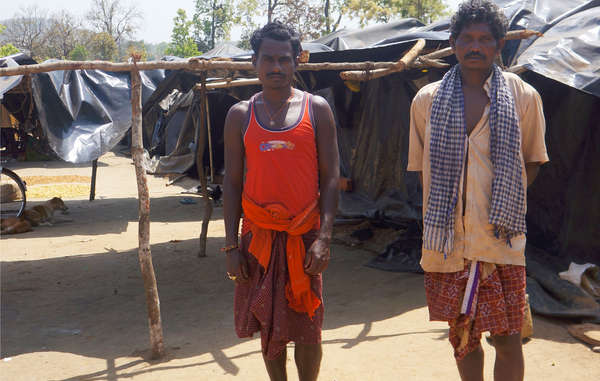
These Khadia tribespeople were evicted from a tiger reserve and forced to live for months under plastic sheets. Promises of “compensation” are rarely fulfilled. © Survival
This weekend’s protest is a local flashpoint in an ongoing national issue. Tribal peoples living in tiger reserves across India are being forced to leave their ancestral homelands in the name of tiger conservation. However, tiger numbers have increased rapidly in the first reserve in India where a tribe won the right to stay on their land, showing people and tigers can flourish alongside one another.
Survival International, the global movement for tribal peoples’ rights, launched a tourist boycott in November last year, urging visitors to India not to visit any of India’s tiger reserves until the Indian tiger authority respects tribal peoples’ rights to live in and protect their forests.
Survival Director Stephen Corry said: “These evictions, both inside and outside the tiger reserves, are totally unjustified, as well as illegal. Not only do they destroy the lives of the people forced from their homes, but they don’t help the tigers either. The authorities and WWF promised there would be no evictions – as so often in the past, such promises have proven worthless.”
Background briefing
– Baiga means “medicine man.” Baiga people are known for their distinctive tattoos, and for their very close relationship to their environment.
– Tribal people were evicted from Similipal tiger reserve in 2013, and were soon after found living in dire conditions under plastic sheets.
– Many Baiga were evicted from the nearby Kanha tiger reserve in 2014. They received no land, houses, or support but were supposed to find land to buy with their compensation money, an alien concept for those who’d lived all their lives in the forest. They told Survival: “We got some money, but we are lost – wandering in search of land. Here there is only sadness. We need the jungle.”
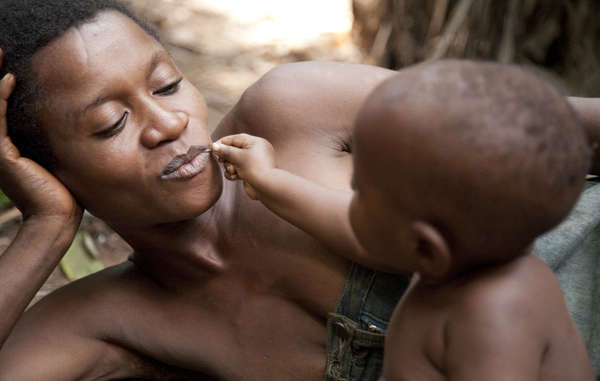
by Deep Green Resistance News Service | Mar 9, 2018 | Colonialism & Conquest
Featured image: The Baka are better at looking after their environment than anyone else. © Selcen Kucukustel/Atlas
by Survival International
Four Baka – two women and two men – were beaten up by eco-guards in the Republic of Congo last week. The Baka had just returned to their village, after spending the day in the forest, when a squad of eco-guards arrived and accused them of hunting elephants.
Survival has received reports that the two Baka men were arrested and are now in prison, even though the eco-guards found no evidence that they had been hunting.
A similar case of abuse was reported in a neighbouring community a week earlier, around 23 February: a group of Baka were coming out from the forest when eco-guards beat them up and arrested them.
Eco-guards are patrolling huge swathes of north-east Congo Republic, including regions which are not officially recognized as “protected” areas. They are funded and equipped by WWF and according to several sources, are spreading terror among Baka in the name of conservation.
A Baka man told Survival: “They always do that kind of abuse, especially to Baka. They need to beat people to show they are doing a good job.”
Eco-guards are also involved in other cases of abuse, harassment, torture and arrest of innocent Baka people. One case, in early 2017, was described as a “catastrophe.” The guards made Baka men, women and children strip to their waists, get to the ground and “crawl like snakes” while the guards kicked and whipped them with their belts.
Physical violence is just one part of the abuse that tribal people have to face in the name of conservation. Eco-guards regularly steal Baka food, burn their homes and destroy their tools.
“The eco-guards came here to abuse us for nothing. Every time it is beatings and whippings–and they break our radios, and pierce our cooking pots,” says one Baka man.
Today the Baka say they do not feel free to move around and live in their ancestral land. The climate of fear is so strong that they feel unable to hunt, fish and gather plants to feed their families, with serious consequences for the Baka’s health and well-being.
These abuses are not just illegal: they are harming conservation. Targeting tribal hunters diverts action away from tackling the true poachers–criminals conspiring with corrupt officials–and harms conservation.
Moreover, the big conservation organizations are partnering with industry and tourism and destroying the environment’s best allies. Like many tribal peoples, the Baka know better than anyone else how to take care of elephants and other wildlife in their forests.
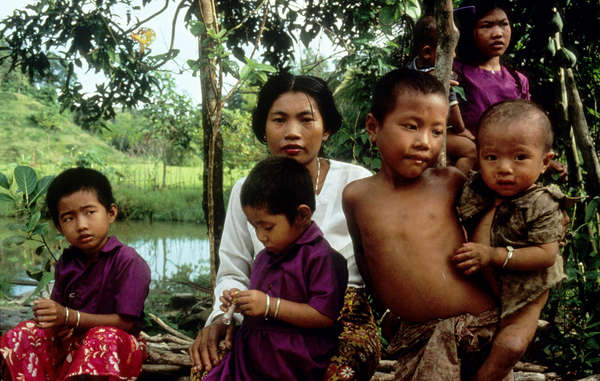
by Deep Green Resistance News Service | Feb 18, 2018 | Colonialism & Conquest
Featured image: The Marma, like other tribes of the CHT, have faced years of violence, land-grabbing and intimidation. © Mark McEvoy/Survival International
by Survival International
Two sisters from the Marma indigenous tribe of the Chittagong Hill Tracts in Bangladesh are being held against their will after being raped and sexually assaulted at gun point, allegedly by members of the Bangladesh security forces.
The Jummas, a collective name for the tribes living in the CHT, continue to face endemic violence, land-grabbing and intimidation on their ancestral land. Jumma women and girls are frequently subjected to rape and sexual assault at the hands of Bengali settlers and the armed forces.
The Marma girls, aged 19 and 14, describe men in army uniforms entering their house during a raid in the early hours of January 22. They report that the older sister was raped and the younger was sexually assaulted during an attempted rape.
The army and other security forces have denied the attacks took place, and the authorities are now not allowing the girls to be released from hospital. Their room is being guarded by police who are refusing to allow human rights activists or journalists to talk to the victims.
The sisters fear for their own, and their family’s, safety. Those who have been able to speak to the girls report that they are traumatised, not only by the initial brutal attacks but also by the numerous interrogations by male police officers and the entry of male security personnel into their hospital room throughout the day and night.
The girls speak only their tribal Marma language and have been refused access to familiar indigenous food brought to the hospital by well wishers.
Raja Devasish Roy, the Chakma king, Survival and other human rights activists have called for the girls to be released from the hospital and for the perpetrators to be brought to justice.








